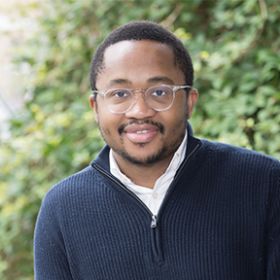People
Fanele Mashwama
Fanele Mashwama
“People here are truly invested in your personal success.”
Fanele Mashwama (he/him) first arrived at Harvard as an undergraduate. While earning his philosophy degree, he simultaneously worked in the central bank of his home country of eSwatini, where he became more and more interested in the relationship between economic policy and inequality / distributive justice. “The policy space is a space where we can, and should, put our ethical convictions into practice,” he says.
After graduation, Fanele spent two years with McKinsey & Company before returning to Harvard for a doctorate. He had already made connections with faculty members Michael Kremer and Shawn Cole—plus he had an existing network of friends and colleagues in the Boston area—so he felt confident that HBS would be the right fit. “The Business Economics program struck the right balance between background economic theory and domain specific content – finance in my case. Paired with the resources at HBS, one has a great deal of ownership over their doctoral experience here and as such I knew this was the right place for me.” For instance, he adds, “To access sensitive administrative data in emerging markets, you need to occasionally be in-person in data-centers halfway around the world or get research assistant help in-country—this simply wouldn’t have been possible as a graduate student without the resources of a place like HBS.”
In addition to Professors Kremer and Cole, Fanele has had the chance to learn from other mentors and collaborate with a range of folks interested in similar questions. “There are several people in the program who think about the questions that matter to me, such as how to ethically regulate financial markets with a look to real outcomes,” Fanele says. However, it’s just as important that not everyone is approaching their work the same way. “There’s enough heterogeneity in people’s interests that you can learn from their approaches and simultaneously have your presumptions challenged,” he reports.
Research
Fanele is currently investigating two distinct research questions, each pertaining to distributional consequences of financial regulation. In the first, he is looking at episodes of capital flight in emerging markets and the way that the currency composition of firm liabilities can have serious ripples effects in times of turbulence. “Firms in emerging markets, take Nigeria for example, might take on dollar liabilities for a variety of reasons; this debt might exacerbate downturns,” explains Fanele. “Those firms likely earn Naira revenues but have to service dollar denominated debt.”
Fanele’s second research interest concerns sovereign immunity. “There’s an entire body of law that determines when judicial authority can be exercised over sovereigns,” Fanele says. He is investigating how the limits of sovereign immunity affect the workings of financial markets for sovereign liabilities. “The circumstances under which you can enforce findings against sovereigns across state boundaries is an important question for financial markets, and will influence how willing financial intermediaries are to mediate markets for sovereign liabilities.”
Both research interests are ultimately informed by a desire to understand cross-border distributional consequences of financial regulation. “The pandemic made it very clear that you can’t think about prosperity for one country in isolation. There are important interdependencies in these markets -- with real consequences – that I am not sure we have fully understood yet.”

